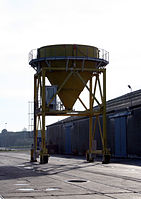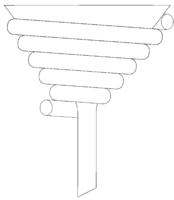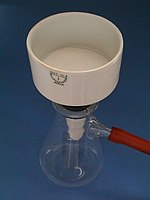funnel
A funnel (from Middle High German trihter / trahter from Latin trajectorium "transition") is a device that can be used to transfer liquids or small-grained substances into vessels with a small opening, e.g. B. Bottles, can fill without spilling anything. With high-quality funnels, the neck (the thin part) is provided on the outside with a notch or a bead, which is used to let air escape from the vessel to be filled.
Types of funnels and their function
If small amounts of solids are to be separated from a suspension in the laboratory, the Hirsch funnel with suction tube is used. A Buchner funnel or a glass suction filter is used in the laboratory to separate larger amounts of solids .
Conical ground joint funnels are well suited for filling liquid or powdery reagents into multi-necked flasks, as the funnel body is flattened on the side and the stem end is adapted to one of the NS conical ground joints NS 14/23, NS 19/26 or NS 29/32.
Powder funnels have a very wide stem only a few centimeters long and are useful for filling solid substances into storage bottles or reaction vessels (example: round-bottom flasks ). There are versions made of glass as well as plastic as well as smooth handles or those with a standard cut.
Dropping funnels with standard ground joints are often part of apparatus for preparative synthesis in chemical laboratories . There are designs with and without pressure compensation.
Makeshift funnels in the household: half an eggshell pierced at the tip, beverage carton cut to size , cone for powder wrapped in paper .
Büchner funnel with inserted round filter paper on a suction bottle with a connected vacuum hose
In jest or colloquially called teaching method
The verb eintrichtern colloquially means “to force someone to teach something ” (see Wiktionary under #Weblinks ). Bringing someone up to the funnel means colloquially "to lead someone to their own knowledge".
The “ Nuremberg funnel ” is also a jokingly devised teaching method which, in contrast to the previous one, promises practically effortless acquisition of any amount of extensive knowledge.
Fun became serious when the Faculty of Mathematics at the University of Regensburg offered lecture texts in a series of Regensburg funnels in which, for example, Günter Tammes étale cohomology forms Volume 17 (1979).
See also
Web links
Individual evidence
- ↑ Heinz GO Becker, Werner Berger, Günter Domschke, Egon Fanghänel , Jürgen Faust, Mechthild Fischer, Fritjof Gentz, Karl Gewald , Reiner Gluch, Roland Mayer, Klaus Müller, Dietrich Pavel, Hermann Schmidt, Karl Schollberg, Klaus Schwetlick, Erika Seiler and Günter Zeppenfeld: Organikum. Johann Ambrosius Barth Verlag, 1993 , 19th edition, pp. 30–32, ISBN 3-335-00343-8 .
- ^ A b Gerhard Meyendorf: Laboratory equipment and chemicals. People and knowledge Volkseigener Verlag Berlin, 1965, p. 59.








